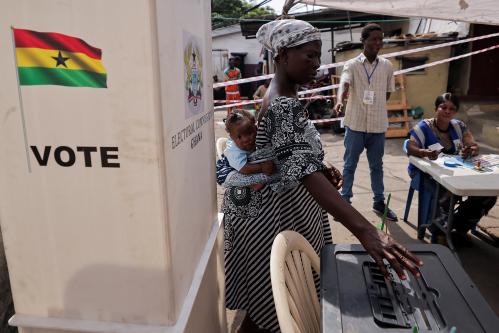Over the last six decades, European countries have moved in what often seemed like a slow and convoluted path toward closer cooperation. Yet, after a history of war and colonialism Europe’s transformation into a peaceful continent, a constructive neighbor and a generous international donor is a great benefit to the world.
However, at the upcoming IMF and World Bank spring meetings, Greece’s ongoing financial crisis will illustrate the challenges that Europe still faces in creating a strong and cohesive union, as well as the risks of global financial instability should Europe fail to manage threats of a Greek default. Moreover, the ongoing debates about IMF and World Bank governance reform are a reminder of Europe’s continual inability to create a coherent geopolitical presence, which is now becoming a major obstacle to effective global governance. To put it bluntly, the stalemate of Europe’s internal governance reform is creating gridlock for reform of global governance.
It is clear that the global institutions created after World War II do not reflect the economic and political realities of the 21st century. The end of colonialism, the rise of large emerging markets, the growing interconnectedness of world economies and the threats of global financial instability and climate change require inclusive, representative and effective global institutions. This has put a spotlight on existing international organizations, including the G8, UN Security Council, IMF and World Bank, and their governance structures. All of them reflect the past dominance of Europe and the United States and must be reformed to represent the new balance of world economic and political influence.
Europeans tend to think of the U.S. as the superpower promoting its own values through unilateralism, exceptionalism and hard power, unwilling to give up its privileges in international institutions. They see Europe as a harmonious community of diverse nations with a preference for compromise and soft power. In fact, Europe often aggressively projects “European values” in foreign relations, touts its experience of multinational integration as an example for others and insists on representation in international institutions far beyond its actual size or strength.
Excluding Russia, Europe occupies four seats at the G8 and two of the five permanent seats on the UN Security Council. It occupies eight to nine of the 24 seats at the IMF and World Bank and represents about 30% of their voting share. This compares with Europe’s share of 7.5% in the world’s population and 23% in the global economy. The Europeans also have traditionally nominated the head of the IMF. In the newly created G-20 summit, Europe occupies five of the 20 seats, a more reasonable share than the 50% in the G8. However, the addition of the Netherlands and Spain raises the de facto representation of Europe at G-20 summits. European requests for an additional “Nordic chair” and a seat for the political head of the Eurozone at the G-20 further reflect the sense of entitlement to an extraordinary role in international forums.
There have been calls for a reduced representation of Europe in the major global institutions and a reallocation of its voting shares and governance arrangements that is more closely aligned with its current global economic and political weight. In the World Trade Organization, the European Union is already represented as a single entity, but this remains the exception. With only limited EU constitutional reforms agreed under the Lisbon Treaty, stalemate prevails in EU reform of its foreign policy process. This perpetuates the EU’s inability to speak with one voice, to cast a singular vote, and to occupy one or at least fewer chairs in international organizations. This has become a major stumbling block for global governance reform. Since the Europeans are unwilling to give up on excessive individual country representation and voting shares in the governing boards of the international organizations, they keep out other key players and prevent a recalibration of voting structures that reflect today’s changing global realities.
The consequence of this is four-fold: First, global governance reform faces gridlock. Second, international institutions lose effectiveness and legitimacy. Third, formal European dominance in these institutions is rendered meaningless by the cacophony of European voices and lack of cohesion in votes. Fourth, Europe over time is increasingly marginalized in global decision making. This outcome serves neither global nor European interests. It may be counter-intuitive, but if the Europeans give up votes and chairs in the international institutions, they will wield more influence in more effective global institutions.
Until the Europeans are ready to address their own governance challenge, there is little hope for effective reform of global governance structures. But we sense a growing impatience in the rest of the world with European exceptionalism. Furthermore, the global financial crisis, followed now by the Greek financial upheavals, has put the Europeans on notice that business as usual will not work for them. We hope that the European political leadership will grasp this opportunity to change the way in which Europe acts on the global stage.
The Brookings Institution is committed to quality, independence, and impact.
We are supported by a diverse array of funders. In line with our values and policies, each Brookings publication represents the sole views of its author(s).



Commentary
Op-edEurope’s Governance Stalemate Causes Gridlock for Global Governance Reform
April 23, 2010